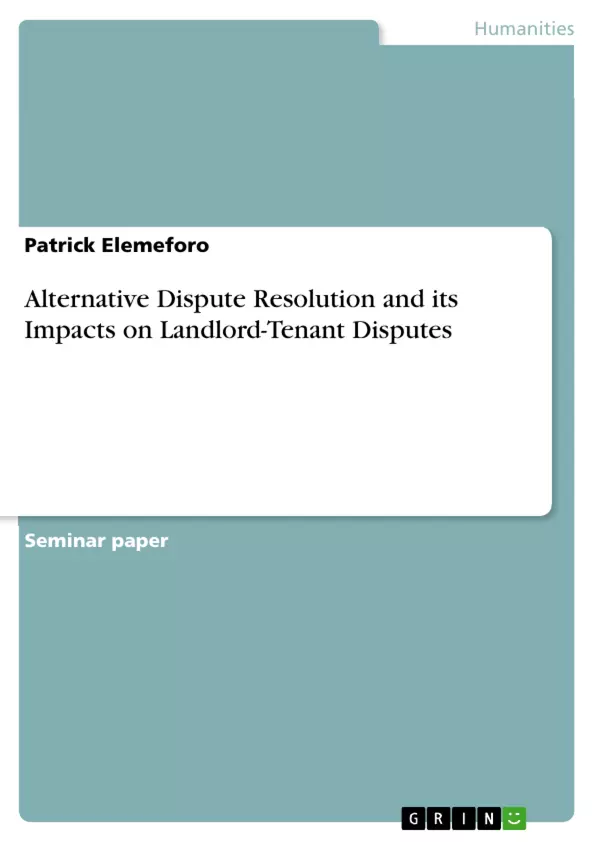The primary objective of this research is to investigate the impact of Alternative Dispute Resolution (ADR) on landlord-tenant disputes in the Yenagoa Local Government Area of Bayelsa State. The study aims to assess the prevalence and intensity of such disputes and their effects on the socio-economic development of the area. Additionally, it seeks to evaluate the strategies used to resolve these disputes, the awareness of citizens regarding the existence of ADR, and the effectiveness of ADR as an alternative to the conventional police and court methods for resolving landlord-tenant conflicts.
Conflict, disputes, and misunderstandings have been an inherent part of human interaction throughout history. They frequently stem from the divergence of goals, values, and interests among individuals and groups. Resolving these disputes is essential for maintaining social harmony and preventing conflicts from escalating into violence or war. Misunderstandings, disagreements, disputes, and conflicts can emerge between neighbors, landlords and tenants, communities, and even nations. The consequences of such disputes can be severe, leading to property damage, injuries, loss of life, and extensive destruction.
One common response to these disputes has been to initiate criminal cases, often resulting in lengthy and protracted legal processes. However, these legal avenues may not always provide satisfactory resolutions or promote healing among the parties involved. It is in response to these challenges that Alternative Dispute Resolution (ADR) emerges as an innovative and non-confrontational approach to resolving disputes. ADR offers a more peaceful and harmonious means of addressing conflicts, diverting from the traditional approach of resorting to criminal proceedings as soon as one's rights are perceived to be violated.
The study will explore the following hypotheses:
1. There is a significant relationship between dispute resolution and societal development.
2. The introduction of Alternative Dispute Resolution (ADR) in Yenagoa Local Government Area has a significant impact on conflict resolution.
In conclusion, this research aims to shed light on the effectiveness of Alternative Dispute Resolution (ADR) in mitigating and resolving landlord-tenant disputes in Yenagoa, Nigeria. Understanding the impact of ADR is crucial for promoting peaceful coexistence, conflict resolution, and overall societal development.
Inhaltsverzeichnis (Table of Contents)
- CHAPTER ONE
- INTRODUCTION
- BACKGROUND OF THE STUDY
- Statement of the Problem
- Objective of the Study
- Research Questions
- Research Hypothesis
- Significance of the study
- Scope and Limitation of the study
- Definition of Terms
- CHAPTER TWO
- REVIEW OF RELEVANT LITERATURE
- Meaning and Definition of Societal Conflict
- Concepts in Conflict
- Conflict Indicators
- Types of Societal Conflict
- Theory of Conflict (The Conflict Theory)
- Causes of Societal Conflict
- Conflict Triggers
- Stages of Societal Conflict
- Effect of Conflict
- Conflict Prevention
- Conflict Management
- Conflict Resolution
- Method of Conflict Resolution
- Alternative Dispute Resolution (ADR)
- Appropriate and Inappropriate Uses of ADR
- Types of ADR
- The Bottom Line
- CHAPTER THREE
- RESEARCH METHODOLOGY
- Research Design
- Sample and Sampling Technique
- Instruments for Data Collection
- Method of Data Collection
- Development and Validation
- Method of Data Analysis
- CHAPTER FOUR
- SUMMARY AND CONCLUSION
Zielsetzung und Themenschwerpunkte (Objectives and Key Themes)
This research paper aims to investigate the impact of Alternative Dispute Resolution (ADR) on landlord-tenant disputes in Yenagoa, Bayelsa State, Nigeria. It explores the significance of ADR as an alternative to traditional legal proceedings, examining its effectiveness in resolving disputes and fostering amicable outcomes.
- The prevalence and impact of conflict, particularly in the context of landlord-tenant relationships.
- The conceptual framework and theory behind conflict and dispute resolution.
- The emergence and significance of ADR as a method for resolving disputes.
- The different types of ADR mechanisms and their suitability for landlord-tenant disputes.
- The effectiveness of ADR in achieving fair and equitable outcomes for both landlords and tenants.
Zusammenfassung der Kapitel (Chapter Summaries)
Chapter One: Introduction
This chapter establishes the context for the study, highlighting the pervasive nature of disputes and conflicts within society, particularly between landlords and tenants. It underscores the need for effective dispute resolution mechanisms, emphasizing the importance of alternative approaches to traditional legal proceedings. The chapter outlines the research's objectives, research questions, hypotheses, significance, scope, limitations, and definitions of key terms.
Chapter Two: Review of Relevant Literature
This chapter delves into the theoretical foundations of societal conflict and its causes, triggers, stages, and effects. It explores the concept of conflict resolution and examines the emergence and significance of ADR as a viable alternative to traditional legal proceedings. The chapter discusses the various types of ADR mechanisms and their appropriate uses in different dispute situations.
Chapter Three: Research Methodology
This chapter outlines the research design, sample selection, data collection methods, and data analysis techniques employed in the study. It provides details on the research instruments and procedures used to gather and analyze data related to landlord-tenant disputes and the effectiveness of ADR.
Schlüsselwörter (Keywords)
The research focuses on alternative dispute resolution, landlord-tenant disputes, societal conflict, conflict resolution, ADR mechanisms, dispute resolution effectiveness, and conflict management. The study explores empirical data and insights to evaluate the impact of ADR in resolving disputes, fostering reconciliation, and promoting peaceful coexistence between landlords and tenants in Yenagoa, Bayelsa State, Nigeria.
- Arbeit zitieren
- Patrick Elemeforo (Autor:in), Alternative Dispute Resolution and its Impacts on Landlord-Tenant Disputes, München, GRIN Verlag, https://www.grin.com/document/1413966



